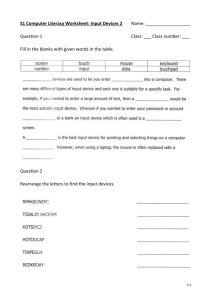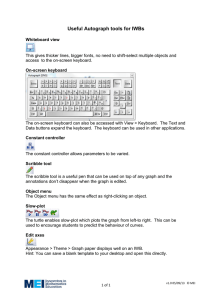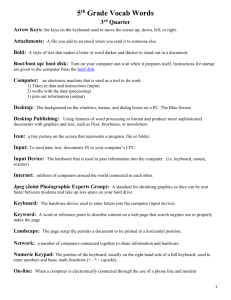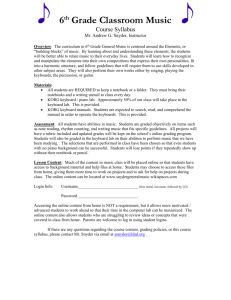MU 201 - Music Theory III Syllabus
advertisement
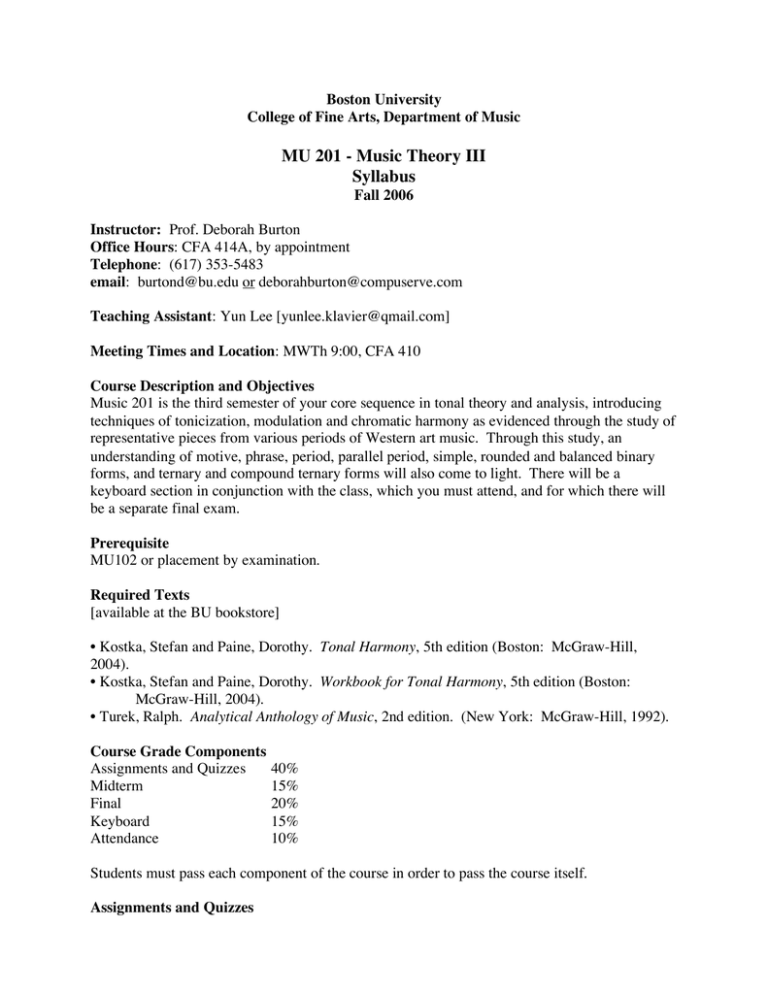
Boston University College of Fine Arts, Department of Music MU 201 - Music Theory III Syllabus Fall 2006 Instructor: Prof. Deborah Burton Office Hours: CFA 414A, by appointment Telephone: (617) 353-5483 email: burtond@bu.edu or deborahburton@compuserve.com Teaching Assistant: Yun Lee [yunlee.klavier@qmail.com] Meeting Times and Location: MWTh 9:00, CFA 410 Course Description and Objectives Music 201 is the third semester of your core sequence in tonal theory and analysis, introducing techniques of tonicization, modulation and chromatic harmony as evidenced through the study of representative pieces from various periods of Western art music. Through this study, an understanding of motive, phrase, period, parallel period, simple, rounded and balanced binary forms, and ternary and compound ternary forms will also come to light. There will be a keyboard section in conjunction with the class, which you must attend, and for which there will be a separate final exam. Prerequisite MU102 or placement by examination. Required Texts [available at the BU bookstore] • Kostka, Stefan and Paine, Dorothy. Tonal Harmony, 5th edition (Boston: McGraw-Hill, 2004). • Kostka, Stefan and Paine, Dorothy. Workbook for Tonal Harmony, 5th edition (Boston: McGraw-Hill, 2004). • Turek, Ralph. Analytical Anthology of Music, 2nd edition. (New York: McGraw-Hill, 1992). Course Grade Components Assignments and Quizzes Midterm Final Keyboard Attendance 40% 15% 20% 15% 10% Students must pass each component of the course in order to pass the course itself. Assignments and Quizzes All written assignments are due at the beginning of class. Late assignments will go down one grade for every twenty-four hours the work is late. For example, an A assignment, one day late, will receive an A-. However, the lowest grade you can receive for handing in a completed assignment is a D. Therefore, even if your work is very late, you should still hand it in. Exceptions will be made only with valid written documentation of a conflict. If you want to hand in non-required written assignments for extra credit, that is fine; they will be counted as one-half a normal assignment. Make-up exam/quiz policy If you have a legitimate excuse for missing an exam, you will be able to take a make-up exam, the date of which will be mutually agreed upon. Attendance Policy Your attendance is required at all class meetings, including keyboard section meetings, and it is 10% of your grade. Excused absences include: (1) illness with a note from a doctor, the day you return to class, (2) a note for official school business, (3) observance of religious holidays, or (4) an extenuating family circumstance. If a class is missed, it is your responsibility to find out what was covered and what homework was assigned. Conduct You are expected to abide by the CFA Academic Conduct Code. Cases of suspected misconduct will be referred to the Dean's Office. Cellular Phones All cell phones are to be turned off in class. If your phone rings, you must silence it immediately and may not answer it during class time. If you are expecting an urgent phone call, please let me know before class and an exception can be made. Disabilities A student with disabilities must register with the Office of Disability Services prior to the beginning of the first term for which the assistance is being requested. Students will be requested to provide current appropriate documentation of their disability. Course Schedule* wee k 1. dates material Sept. 6, 7 2. 11,13, 14 3. 18, 20, 21 course introduction, Beethoven's 1 First Symphony, functions: tonic, predominant, dominant chapter 16: secondary functions 1, 2 review of dominant 7th inversions and resolutions, review NCTs "secondary" vs. "applied" secondary functions 1- continued, 3 Beethoven 14/2 4. 5. 25, 27, 28 Oct. 2, 4, 5 6. 7. 10, 11, 12 [no class Mon 10/9, but Monday classes on Tuesday 10/10] 16, 18, 19 8. 23, 25, 26 9. 30-Nov. 1, 2 10. 6, 8, 9 11. 13, 15, 16 12. 20 [no classes Wed. 11/22, Thurs 11/23] 27, 29, 30 Dec. 4, 6, 7 11 13. 14. 15. hw chapter 17: secondary functions 2 chapter 18: modulations using diatonic common (pivot) chords minuet/ minuet-trio forms (binary, rounded binary) 4 5 diminished 7ths, Beethoven "Pathétique" review, practice midterm, midterm exam October 26 in class chapter 19: some other modulatory techniques sequences: descending, ascending 5ths sequences: descending 3rds, parallel 10ths, 6ths, 5-6 motions chapter 21: mode mixture 7 " review, practice final review [note: this class may need to be rescheduled] 6 keyboard work review of all major/ minor scales, diatonic harmonies review dominant sevenths and inversions review leading-tone diminished sevenths and inversions figured bass modulations short progressions with modulations, improvised binary forms progressions with dim 7s and dom 7s 8 figured bass 9 sequences 10 sequences - continued 11 figured bass 12 " review keyboard final exam Fina l * course material is subject to change; all alterations will be announced in class.
